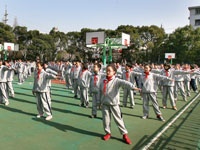Dealing with trouble
(The second period)
By Leslie (胡长征) 田林三中
Teaching objectives:
Language focus:
1. To review the new vocabulary and phrases.
2. To use the words and expressions to describe a certain person or an event.
Ability focus:
1. To report to the police by phone.
2. To develop oral skills and imagination.
Emotional objectives:
1. When someone is in trouble, we should try to help them.
2. We don’t need to put ourselves in danger.
|
Procedures |
Contents |
Activity |
Purpose |
|
Pre-task |
1. Riddles 2.A short competition |
T –Ss Guess the words according to the phrases. Ss guess the most words in a minute |
To warm up To review the words |
|
While-task |
1. Story retelling 2. Key questions: What would Paul’s father report to the police? 3. Guessing the ‘robber’ 4. |
T-Ss Use the given words and phrases to retell the story. T- show the questions and make a modeled dialogue with students. Ss work in pairs to make dialogues using the given pictures and guessing the ‘robber’ according to the descriptions. Ss read the diary and answer the questions. |
To grasp the use of the new words and expressions. To develop Ss’ ability of description. To let Ss know that we should help someone who is in trouble and we can help them in an indirect way. |
|
Post-task |
1. Dialogue 2. Flash(Fire) 3. Discussion What should we do when we meet the trouble? |
Ss report a traffic accident to the police. Ss watch and discuss. Ss give their suggestions. |
To know how to deal with trouble in some clever ways. To consolidate what they have learnt. |
|
Assignments |
1. Write a report on how to deal with troubles. 2. Learn to sing the song ‘Trouble is a friend’. | ||



















